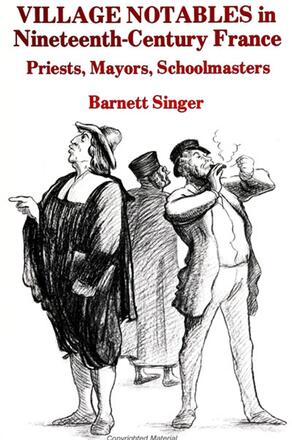
Village Notables in Nineteenth-Century France
Priests, Mayors, Schoolmasters
Alternative formats available from:
Examines the role of village notables in nineteenth-century France.
Description
Local priests, mayors, and schoolmasters have often been portrayed by French novelists as objects of ridicule. In reality, however, the village notables gave norms to the villagers in their communities and personified the community's values. The influence of village notables and the values they preached and personified ensure their importance in any view of French rural history. Their world was already in transition towards modernity, and they both guided and impeded the process.
Village Notables in Nineteenth-Century France tells who these notables were, where they came from, what they thought, what influence they had in local society, how they competed with each other for village hegemony or enhanced status, and what problems they endured. The book is a lively account, solidly based on extensive archival research and other primary sources. It gives the reader a feel for the era and the milieu.
Barnett Singer is Assistant Professor of History at the University of Victoria, Canada. He has published several books and numerous articles on topics in modern French history.
Reviews
"Writing in a smoothly flowing and personable manner, Singer blends together a large and impressive array of sources—literary accounts, local and regional archival records, personal interviews, secondary works, and even some of his own on-the-spot observations (albeit a century or so removed)—to establish the character, concerns, and mentalité of village notables in their quest for local preeminence … Singer's book is well written and informative. Those interested in contemporary French history will find it particularly useful in helping them gain an appreciation of the ways in which the central concerns and authorities of the state vied with and eventually prevailed over the agents of traditionalism in the French countryside. " — Journal of Interdisciplinary History
"Singer recognizes the problem of generalizing about the outlook or mentality of his subjects, especially in a country of such regional diversity as nineteenth-century France; but, drawing on information from a variety of French archives and an impressive number of secondary sources, he suggests some illuminating conclusions about the origins of mayors, priests, and schoolmasters, about their differing world views, about the undoubted loneliness and isolation of many rural clergy and teachers. " — History Today
"This richly documented study sheds considerable new light on the necessary relationship of local notables to the character of rural France as a whole before modern media and transformations rendered them obsolete … The reader comes away from this impressive volume with an enriched sense of nineteenth-century French history and civilization. " — French Review
"Like [Eugen] Weber, Singer has an eye for significant detail, and his study is brimming with stories lovingly culled from archives of the départements of France … The struggles of mayors, priests, and schoolteachers with their superiors, each other, and their clients are evocatively presented … It is that difficult position of being an 'in-betweener' that Singer captures so nicely. " — Histoire Sociale / Social History
"The topic is an essential part of nineteenth-century French culture. Nothing could be more interesting than to learn more about the old rural order. The basic research in provincial archives, generously on view here, is enthusiastically presented, properly blended with the conclusions of other scholars working from similar materials on similar themes. Dr. Singer writes engagingly, in an easy and personal manner, communicating his very close knowledge of certain aspects of provincial France. His picture of these 'notables' is fresh, complex, and always interesting. " — John C. Cairns, University of Toronto